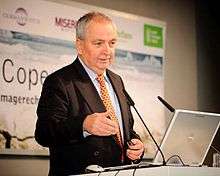Klaus Töpfer
Klaus Töpfer (born 29 July 1938 in Waldenburg, Silesia) is a German politician (CDU) and environmental politics expert. From 1998 to 2006 he was executive director of the United Nations Environment Programme (UNEP).
Klaus Töpfer | |
|---|---|
 Klaus Töpfer, 2009 | |
| Born | Klaus Töpfer 29 July 1938 |
| Nationality | German |
| Occupation | Politician, UN official |
| Office | Member of the Bundestag |
Early life and education
Töpfer studied economics in Mainz, Frankfurt and Münster. In 1968 he earned his doctorate at the University of Münster.
Early career
In 1971, Töpfer was appointed Head of Planning and Information of the Federal State of Saarland, a post he held until 1978. During that time, he also served as a visiting professor at the Academy of Administrative Sciences in Speyer, and consulted several countries on development policy, among them Egypt, Brazil and Jordan. He spent the following year at the University of Hannover as Professor and Director of the Institute for Spatial Research and Planning.
Political career
In 1985 Töpfer became State Minister for the Environment and Health in the government of Minister President Bernhard Vogel of Rhineland-Palatinate.
In 1987 Töpfer became Federal Minister for the Environment, Nature Conservation and Nuclear Safety under Chancellor Helmut Kohl. During his time in office, Germany established the Federal Office for Radiation Protection as a response to the Chernobyl disaster. From 1994 to 1998 he served as Federal Minister for Regional Planning, Civil Engineering and Urban Development. He was member of the Bundestag from 1990 to 1998 and member of the Steering Committee of the CDU from 1992 to 1998.
In 1998 Töpfer was appointed Under Secretary General of the United Nations, General director of the United Nations office in Nairobi and Executive Director of the United Nations Environment Programme. Among the milestones of his eight-year tenure are a number of important environmental agreements, including the Cartagena Protocol on Biosafety and the Stockholm Convention on Persistent Organic Pollutants. Töpfer was also closely involved in behind-the-scenes negotiations in support of the Kyoto Protocol on climate change. In June 2006 he was succeeded in this office by Achim Steiner. As director of UNEP, he has had a key role in gauging and attempting to remedy the environmental costs of the 2004 Asian tsunami.
Later career
In 2009 Töpfer was appointed founding director of the Institute for Advanced Sustainability Studies (IASS) which performs research between climate problems and sustainable economics. This institute is located at Potsdam, Germany. The institutes funding is provided by the federal government of Germany Federal Ministry of Education and Research (Germany).
Töpfer was rumored as a possible successor to the German presidency after Christian Wulff's resignation.[1] He later served as co-chairman of the Federal Government’s Ethics Commission on a Safe Energy Supply.
Since 2013 Töpfer has been heading the project "DEMOENERGY – The Transformation of the Energy System as the Engine for Democratic Innovations"[2] together with Claus Leggewie and Patrizia Nanz (both Institute for Advanced Study in the Humanities Essen, Germany). In 2016, the United Nations Economic and Social Council (ECOSOC) appointed Töpfer as co-chairman (alongside Juan Somavia) of an Independent Team of Advisors on positioning the UN development system for the Sustainable Development Goals.
In 2018, Energy Community appointed Töpfer to serve as mediator in an energy dispute between Kosovo and Serbia.[3][4]
Other activities
Corporate boards
- Theva, Member of the Senior Advisory Council (since 2017)[5]
- Porsche, Member of the Sustainability Advisory Board (since 2016)[6]
- ProSiebenSat.1 Media, Member of the Advisory Board (since 2011)
- Deutsche Bank, Member of the Climate Change Advisory Board (2011)[7]
- Volkswind Gruppe, Member of the Advisory Board (2009-2015)
Non-profit organizations
- atmosfair, Patron[8]
- Stiftung Zukunftsfähigkeit, Member of the Advisory Board[9]
- Helmholtz Association of German Research Centres, Member of the Senate (2007-2009)
- Institute for Energy Efficiency in Production (EEP), University of Stuttgart, Member of the Advisory Board[10]
- German Foundation for World Population (DSW), Member of the Advisory Board
- German-Russian Raw Materials Forum, Patron[11]
- Holcim Foundation for Sustainable Construction, Member of the Board[12]
- Agora Energiewende, Chairman of the Council (2013-2018)[13]
- German Council for Sustainable Development (RNE), Member (2001-2010, appointed ad personam by Chancellor Gerhard Schröder)
References
- "Koalition weist Nachfolgersuche von sich". Süddeutsche Zeitung. 7 January 2012.
- "Kulturwissenschaftliches Institut Essen (KWI)". www.kulturwissenschaften.de.
- Christian Geinitz (March 8, 2018), Europäische Stromversorgung: Wie ein Deutscher die Uhren wieder in Takt bringen soll Frankfurter Allgemeine Zeitung.
- Fatos Bytyci and Maja Zuvela (March 13, 2018), Kosovo finds temporary fix for energy glitch slowing Europe's clocks Reuters.
- Senior Advisory Council Theva.
- Sustainability: Porsche appoints renowned experts Porsche, press release of November 28, 2016.
- 2011 Annual Report: Advisory Boards Deutsche Bank.
- Patrons atmosfair
- Advisory Board Stiftung Zukunftsfähigkeit.
- Advisory Board Institute for Energy Efficiency in Production (EEP), University of Stuttgart.
- Patrons German-Russian Raw Materials Forum.
- "Holcim Foundation Advisory Board". Archived from the original on 8 October 2010. Retrieved 11 October 2010.
- Prof. Dr. Klaus Töpfer übergibt Vorsitz des Rates der Agora Energiewende an Dr. Hans-Joachim Ziesing Agora Energiewende, press release of March 5, 2018.
External links
| Wikimedia Commons has media related to Klaus Töpfer. |
